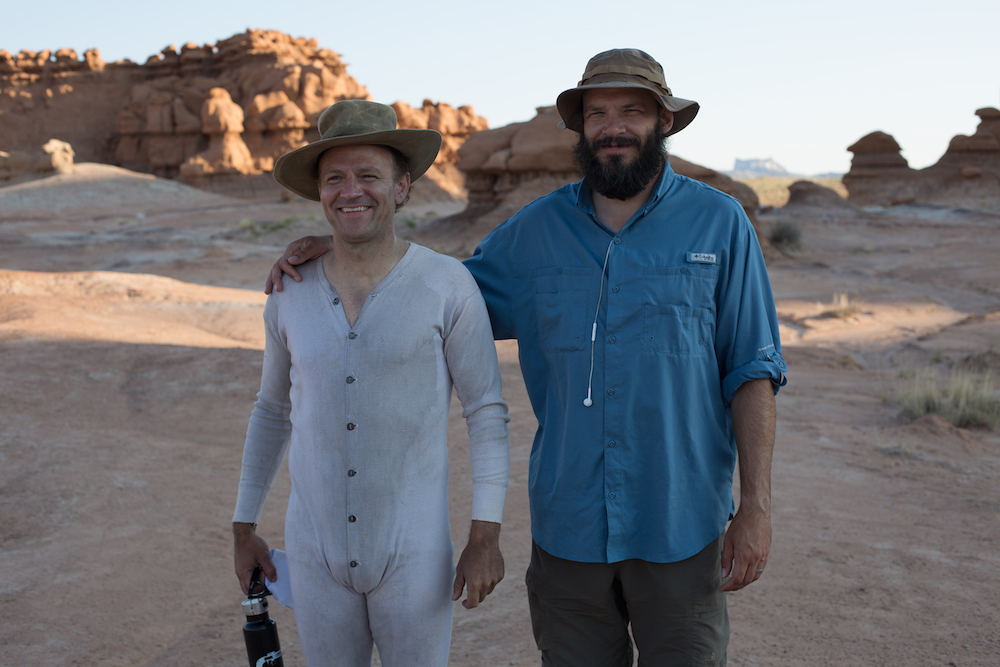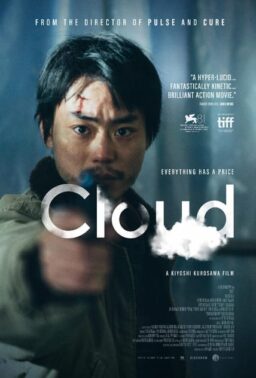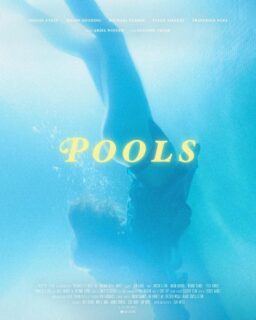A cowboy ventures deep into the Wild West with his pastor sidekick, in hopes of rescuing his one true love who has been kidnapped. It’s a common set-up for a Western but just the beginning of where the wacky, leisurely genre film “Damsel” takes a viewer. Written and directed by Nathan Zellner and David Zellner, the movie is a very amused mix of Looney Tunes and old Western tropes, making for one the season’s stranger delights.
Robert Pattinson stars as the wannabe hero, the unaware goofiness of CHAR making for one of his very best roles yet. Mia Wasikowska, who enters the movie halfway through, uses her vigor to lead the movie down an unexpected path and into definitive commentary. Even the directors themselves color the canvas with goofy supporting roles. As a sweet bonus, there’s a scene-stealing mini-horse (Butterscotch) who is often involved the star of the Zellners’ best visual gags.
During the Chicago Critics Film Festival, RogerEbert.com spoke to the Zellners about their collaborative process, what Mia Wasikowska brought to her character, creating a show-stopping musical number for Robert Pattinson and more.
What kind of people do you think you guys would have been back in the 1800s?
NATHAN ZELLNER: Oh, I don’t know, it’s kind of what you want to be versus what you might actually be [laughs].
DAVID ZELLNER: You’d want to be a tough frontiersman, and maybe you end up being a broken, lost soul [laughs]. It’s all a matter of perspective.
NZ: It always feels like when you research the history, everybody was just these kind of fringe characters always scraping to get by. And anybody who moved out that way it was like, “what are you going to do when you get out there?” “Oh, I’m gonna be a trapper, or I’m gonna hunt gold.” I think that’s what made the period really unique—no one ended up being what they wanted to be [laughs].
So you were looking at the lives of people who were inconsequential to history?
DZ: Oh no, not at all. There is zero historical accuracy with what we did, it’s just based on … a lifetime of loving Westerns and Looney Tunes.
As someone with two brothers of my own, I’m always curious how men inform each other’s ideas of masculinity, which seems to be a big part in this movie. How have you guys influenced each other’s ideas in that way?
NZ: I don’t know … it’s all very intuitive, we don’t talk about this kind of stuff in interviews.
What about growing up?
DZ: Growing up we were always playing the same games and playing the same role model stuff.
Were you guys pretty peaceful as brothers?
DZ: We never really competitive. I mean, Nathan was more into sports and he was better at sports than I was. But we had overlapping interests, but not identical.
NZ: It was never like when we were doing home movies and one of us had to be the bad guy. It was never like, “Oh, it’s my turn.” It was, “Yeah, that sounds great,” and whatever the idea was. “Why don’t you do this?”
DZ: It just took a natural course.

Is that the secret to how you work on a film set, as two brains trying to make one decision?
DZ: Yeah, in part. We also try to work out, especially since we wear different hats, we try to work out as much as we can prior. Especially on the acting, and if we’re audacious enough to cast ourselves, we make sure that we have things worked out with our performances as much as possible beforehand so our time on set is devoted to other people.
Especially with this movie, working with period and weather, what is the advantage of casting yourself?
NZ: I don’t know if it’s an advantage [laughs]. It’s a challenge.
DZ: I think if it was the first time we did it, it would be daunting. But we’ve always done it, since we were kids, before we knew what a director was. We’ve done enough to where we have these binary brains that flip on and off while we’re hopping to different things.
NZ: And yeah, as Dave said, we come as prepared as possible so that we’re not figuring out. We want to make sure we’re giving the proper time to cast and department heads, so that they know what we’re going for and then they can build on top of it.
To direct each other, does that provide a different contention? Is thats the hardest part?
DZ: Oh no, because we’re siblings so we can be blunt with each other [laughs]. We can be very direct. And we just have a shorthand, so we know what to expect and how to work with certain things. We’ve lived with it so long before we came on set, and you always have to adapt. We don’t storyboard, but we might try that for fun at some point.
NZ: It’s because we’re not very good at drawing. But the script is very visual, and it’s like in talking to David, “I’ve got an idea for a scene,” and talking about what a scene is and in a visual sense. And in writing it, the visual stuff is baked in, like when doing one-camera positioning.
DZ: Most of the scenes are pretty mapped out visually, so we try to come knowing how we’re going to do things. And we have a solid blueprint to fall back on, but based on location or weather the way the blocking is playing out or suddenly some lines aren’t working that you’re actually doing. If there’s better ideas that come in at the moment, we throw out the foundation.
You mentioned Looney Tunes earlier, and this movie has a distinct sense of humor. Like there’s a shot of a man sitting on Butterscotch with the dynamite around his neck. It’s a funny visual. How do you guys find that? Do you come prepared with a lot of thos jokes?
NZ: Those were in our head.
DZ: Just the idea of being hung on a horse with your legs touching the ground was from the start, that was something I was very excited about from the moment writing it, I loved the visual.
NZ: The man in the barrel was another.
DZ: Those were particular ideas. There’s very little that we don’t know how we want it to be from the script stage, but then like an example of then it’s built upon when you’re doing it, and there’s a scene where they’re checking each other’s Adam’s apples. That was very much how it was in the script, except the touching each other and lifting the beard, they added that. And it just got ten times weirder.

When Mia Wasikowska got involved, how did the project change, or what did she add to it?
DZ: Robert was attached first, and we were fans of hers. He had worked with her before, and so he helped with that and vouched for her and vouched for us. She was fantastic, and they’re both so easy to work with. We did a decent amount of rehearsal before, and had a foundation with the script that we were going for, but then they put their own stamp on it.
What’s something that she added, especially for her character being so important?
DZ: I think especially, the middle part of the film is probably what we did the most rehearsal with, ironing out things. To make things work a certain way and to have an intensity, and a fluidity that was both highly stylized and had an organic human quality to it. But she was able to tap into that emotionally, but embrace the absurdity as well.
NZ: And it’s a hard place for an actor or actress to start the character. Most of the time there is a little bit of ramp-up. It was something we asked her about and she was super confident and she nailed it. It was part of what she was excited about, that sort of challenge that you normally wouldn’t see.
DZ: What was so great about working with [Pattinson and Wasikowska] is that they were so fearless in doing these roles, and we wanted actors who had not done roles like these before. And I think that they’re roles that people would shy away from, the different facets of the character and the different way they fit into the story structurally. It’s a testament to their confidence and their enthusiasm for challenging themselves and doing these things. I think the stuff that normally scares people away, they dove into wholeheartedly and loved those dynamics. That was fantastic. It would have been really tough if they weren’t [laughs].
Given how things change drastically in the middle, what do you guys want people to know about this story?
DZ: It’s something we’re still feeling out a little bit, because we want people to come see it. It’s funny, for Sundance we just said, “A man travels into the west,” which is this obnoxious one-line which is very misleading, but we love if that could be it.
NZ: I think that works for some people, but I think that you know it’s a western, you know just inherently that there’s lawlessness and any good plan in most movies goes bad. That’s kind of a staple.
DZ: Or, the movie’s kind of boring if everything went perfect. But obviously, things don’t go as planned [laughs].
Is that a specific choice to challenge expectations?
DZ: That was the impetus of the whole thing, that was kind of like the nucleus, and then everything went from there. I think we just love westerns so much, but we didn’t want to do an ersatz version of a spaghetti western, or a John Ford western. As much as we loved those films, they would be so boring. And when people do it, it just looks fake, like cosplay or something. And so, it was just taking the things that we like, and then some cliches that have become tiresome with the genre, and still adhering to the basis of the genre but using it as a springboard to deviate.

When you’re finding the comic tone in genre, especially with some seriousness to it, was that tricky?
NZ: It’s always tricky because from the writing to the production to editing, you can always turn the dial one way or the other. Like, “this scene was maybe in our heads a little more straight, and maybe there is some comedic moments,” and definitely in the middle of the film at the confrontation part it goes back and forth the drama and the absurdity. It was kind of like, looking at what you shot objectively rather than trying to force it one way or the other.
DZ: It’s more just intuitive. We always straddle a line between the humor and the pathos, and those are the kind of movies, some of our favorite movies are dramas that just have moments of … Altman’s good.
NZ: It’s like name the master, basically.
DZ: There are some filmmakers when it’s all seriousness, but I like it when some filmmakers … like “2001: A Space Odyssey” is a very serious moment, but it has some really funny moments in it! You don’t think it as a comedy, but I love that it’s a drama and it has moments of levity.
NZ: Staring at the space toilet [laughs].
There’s a song that Pattinson plays in full toward the middle of the movie—I know that you guys wrote it, but how much time did you have to prepare with him on it?
DZ: I just like the idea of having musical performances in things, and music inspires us just as much as movies do. And when we knew that he was a talented musician, that was an appealing thing. I think just a lot of westerns have cowboy songs in them, but in particular I really liked some Ricky Nelson singing in “Rio Bravo” …
Yeah, it sounded more contemporary.
DZ: Yeah, we love that.
NZ: I think David recorded a demo on his phone, and he worked with Octopus Project to come up with a melody, and then we sent that to Rob. Rob was great on the guitar and just picked it up. We had a fun night when he was singing—
DZ: That was the weirdest night when we were directing, just looking in each other’s eyes [laughs] with Robert Pattinson singing this song.
NZ: We noticed that the first time he was doing it that the crew was all electric at four in the morning.
It’s like a true movie star moment, but with such a bizarre character.
DZ: Yeah! [laughs]
NZ: I know that we used just one take. We could have cut it up with different takes, but he was solid and we didn’t have to do anything. It was more about how many times we want to show David reacting [laughs] with these goofy eyes.












